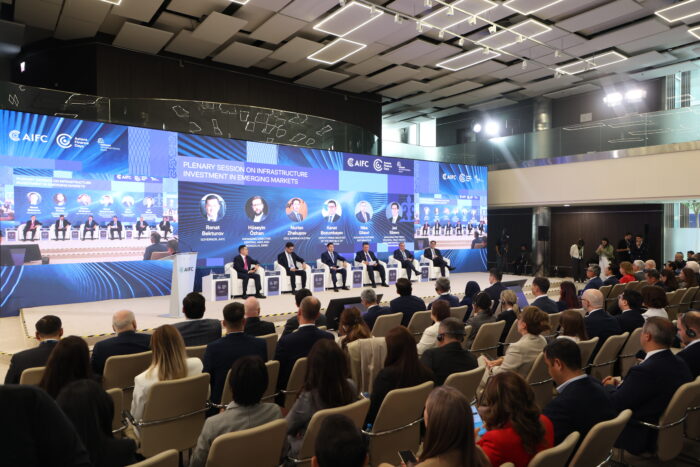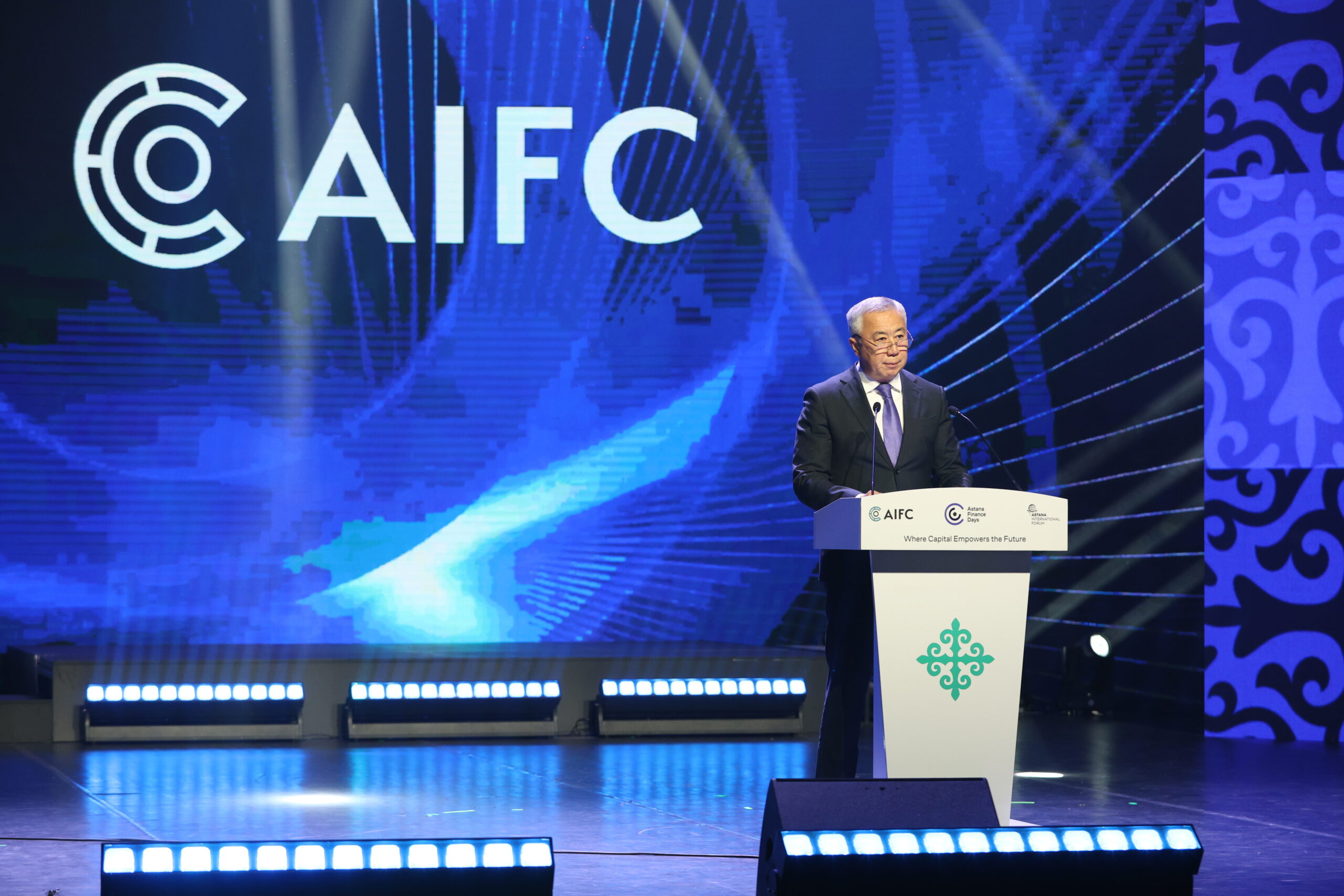Kazakhstan Showcases Investment Vision at Astana Finance Days 2025

ASTANA — The first day of Astana Finance Days 2025 opened on Sept. 4 with a ceremonial program that immersed guests in the spirit and cultural identity of Kazakhstan, setting the tone for the entire event by highlighting the enduring national values of hospitality, fairness, and trust — the very principles at the heart of the Astana International Financial Centre (AIFC).

The high-level plenary session that followed centered on infrastructure investments in emerging markets, with Kazakhstan presented as a regional case study. Photo credit: AIFC press service
Building the future economy through capital
Deputy Prime Minister and Minister of National Economy Serik Zhumangarin outlined the country’s ambitious goal of attracting investment and doubling the size of its economy by 2029 in his address. According to him, this will require at least $150 billion in foreign direct investment and raising gross capital formation to 23% of GDP by 2029. He stressed that the AIFC will play a central role in achieving these goals.
“Since its inception, the AIFC has provided a unique institutional environment built on the principles of English common law, independent regulation, and international standards. This strengthens the confidence of global investors,” he said.
Zhumangarin noted that the AIFC is now home to more than 4,000 companies from 85 countries, spanning industries from asset management and fintech to green finance and Islamic banking.

Zhumangarin: AIFC companies have invested over $17 billion, reinforcing its role as a regional financial hub for Central Asia and Eastern Europe. Photo credit: AIFC press service
“The total investment of these companies in Kazakhstan’s economy has already exceeded $17 billion. This reflects the growing role of the AIFC as an international ecosystem serving not only Kazakhstan but the entire Central Asian and Eastern European region,” he added.
Welcoming participants, AIFC Governor Renat Bekturov reflected on the meaning of the forum’s theme: Where Capital Empowers the Future.
“When we say ‘capital,’ it has many dimensions. First, Astana itself — a young capital city and the home of the AIFC. Second, financial capital — investments, markets, and innovations that drive economies forward. Third, human capital — people, innovators, the builders of tomorrow’s Kazakhstan today. And last but not least, institutional capital — the rule of law and the regulatory framework we have created at the AIFC. This is what builds trust, and trust is the foundation of any financial system,” he said.
Bekturov emphasized that the AIFC brings together investors, innovators, and entrepreneurs under its shanyrak — the traditional Kazakh symbol of unity — guided by the principles of transparency, openness, and integrity.
“We believe the AIFC is setting the rhythm for a new financial hub in Central Asia,” he added.
Following the welcoming remarks, the opening ceremony moved to a Fireside Chat with Renat Bekturov and renowned futurist Brett King and author of global bestsellers, including Augmented: Life in the Smart Lane (2016), which explores how emerging technologies will transform society more in the next 20 years than in the past 250. The book was even cited by Chinese President Xi Jinping as recommended reading on AI. They discussed how AI is transforming finance and the future of global markets. According to King, with the rise of autonomous systems and the automation of supply chains, traditional financial frameworks are no longer fully fit for purpose.

Brett King: Everything we have learned about banking and finance over the past 100 years will soon take on a new form. Photo credit: AIFC press service
“Everything we have learned about banking and finance over the past 100 years will soon take on a new form. We are reimagining how financial services, banking, and policy should function in a world where AI will dominate,” he said.
Infrastructure as the cornerstone of growth
The high-level plenary session that followed centered on infrastructure investments in emerging markets, with Kazakhstan presented as a regional case study. Moderated by Bekturov, the session explored the conditions necessary to attract long-term capital for large-scale infrastructure projects, including energy, transport, and digital connectivity.
Deputy Prime Minister Kanat Bozumbayev stressed that infrastructure investment is the cornerstone of economic growth and development, making it a critical priority for Kazakhstan. He pointed to the government’s new investment headquarters designed to remove barriers in real time and highlighted efforts to modernize the regulatory framework for special economic and industrial zones, which offer tax and customs incentives alongside ready-to-use infrastructure.
“Investor protection is another crucial element that has been significantly strengthened. Investment agreements now ensure long-term stability for 25 years. Several such agreements were signed last year,” Bozumbayev said.
He also emphasized the role of the AIFC in attracting investment and underlined Kazakhstan’s readiness to offer international partners unique opportunities across multiple sectors.

AIFC unveiled a new initiative on the sidelines of the forum — the Museum of Trust. Photo credit: AIFC press service
Chairman of the Samruk-Kazyna Sovereign Wealth Fund Nurlan Zhakupov noted that the companies working under the umbrella of the fund have attracted more than $27 billion in foreign direct investment in recent years. Joint ventures have been established with strategic partners from the United States, China, France, Italy, Germany, Azerbaijan, and Qatar.
Zhakupov emphasized that the fund places sustainability at the core of these partnerships, aligning with the country’s vision to cut carbon emissions by 2030 and achieve carbon neutrality by 2060.
“On Sept. 2, we launched a plant for the production of wind power equipment in Shu, Zhambyl Region, in partnership with Sunny Renewable Energy, a leading global company in the renewable energy sector. The facility has already begun operations and will be fully commissioned by Jan. 1. Thanks to this, all wind energy projects in Kazakhstan will be equipped with modern equipment manufactured domestically,” he said.
Managing Director for Central Asia and Mongolia at the European Bank for Reconstruction and Development (EBRD) Hüseyin Özhan broadened the perspective, noting that infrastructure is not just steel and concrete, but the backbone of the economy, a key enabler of trade, and a vital platform for climate resilience and digital transformation. However, he noted, that the main challenge is to mobilize private capital in emerging markets like Kazakhstan.
“Multilateral and international financial institutions cannot finance infrastructure alone. The private sector has a vital role in building the infrastructure ecosystem. The industry itself shows us that risks should be borne by those who are best placed to manage them. Using this principle, the EBRD continues its reform efforts and policy dialogue with the government, including in the area of public-private partnerships,” Özhan said.
In conclusion, the speakers conveyed that Kazakhstan’s infrastructure drive is not just about physical projects but about building a sustainable investment environment. By strengthening investor protections, fostering international partnerships, and aligning with global climate goals, the country seeks to position itself as a reliable hub for long-term capital and resilient growth.
Museum where finance meets trust
To round out the day, the AIFC unveiled a new initiative on the sidelines of the forum — the Museum of Trust. This corporate museum offers a journey through the history of Kazakhstan’s financial system, from the Great Silk Road to today’s high-tech exchanges and ecosystems.
The museum presents capital not only as an economic tool but as a phenomenon rooted in trust: from merchants who first agreed on money as a universal medium of exchange, to today’s financial markets, where transparent agreements between distant counterparties remain the foundation of the system. By linking the past with the future, the Museum of Trust encapsulates the broader message of Astana Finance Days: that confidence, openness, and partnership remain the true currency of progress.
link





